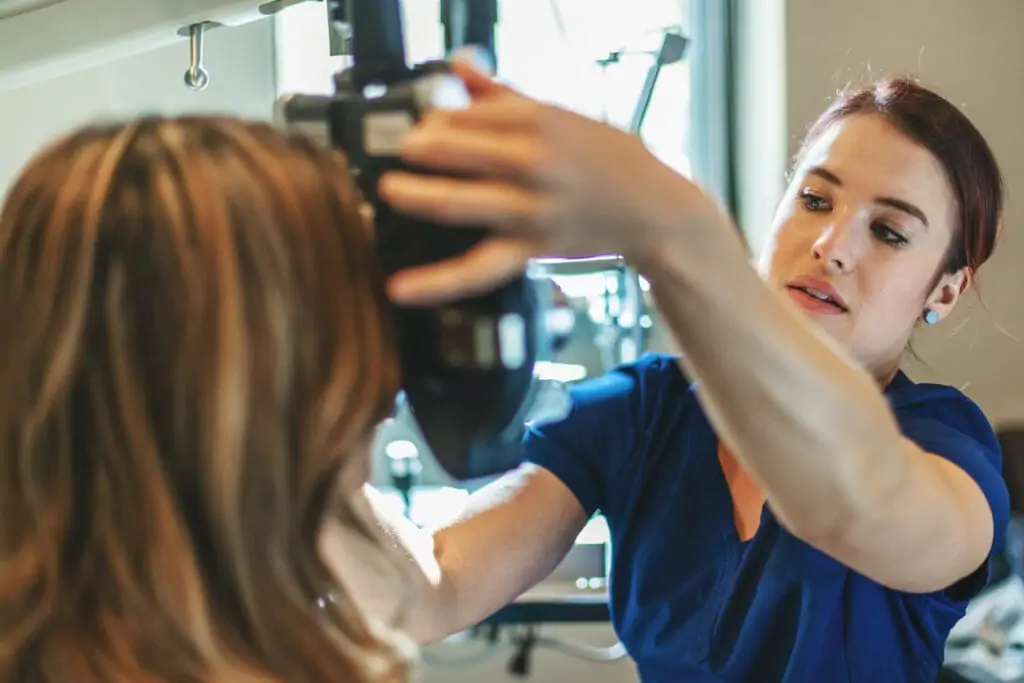Interested in Getting LASIK? Start Here

Getting LASIK or other laser vision correction procedure like SMILE or PRK is a big decision. You need to think it through carefully to make sure you are doing the right thing for your health and vision. To help, here we offer some tips and information on the first important steps to take on the path to making a good decision about getting LASIK: Choosing your surgeon and having a productive laser vision consultation to determine if and what procedure is recommended for you and your vision.
Choosing an eye surgeon
If you are seriously considering a laser vision correction procedure and don’t have a relationship with an eye surgeon, finding one to act as your trusted partner in achieving your vision goals is the first step. Surgeons who specialize in laser vision correction are ophthalmologists (they have an M.D. after their name) who have gone through extensive, additional training. They are known as refractive surgeons.
Not all eye doctors are refractive surgeons. Your regular eye doctor may not have refractive training, so it will be important to talk with your eye doctor about your desire to look into getting LASIK. He or she may refer you to a surgeon they know and respect. You can also talk to friends and family who have had the procedure for their recommendations to a surgeon in your area.
Here are a few suggestions for choosing a LASIK surgeon:
- Be comfortable with your surgeon. He or she should answer all your questions thoroughly and thoughtfully. The point is to help you make an informed decision. The discussion should cover the risks and benefits of any laser vision correction procedure. LASIK is a safe and effective procedure, but it is surgery, and there are limits to what it can achieve. Beware of over promises on results or dismissals of potential risks.
- What is your surgeon’s experience? The more experience a surgeon has, the better. A qualified surgeon will welcome questions about his training and expertise. A highly experienced surgeon has often performed more than 25,000 LASIK procedures.
- Are you a candidate? Not everyone is a good candidate for LASIK – in fact, 15-25 percent of patients don’t meet the qualification standards. Patient selection is essential to a good outcome, so understanding your surgeon’s process is important. Certain medical issues, such as diabetes or thin or damaged corneas, may rule out LASIK as a good option for some people. However, there are other vision correction procedures, such as SMILE or PRK, that may be suitable for a given patient’s needs.
- Price shouldn’t be the priority. It’s natural to want to get a good deal, but this is an investment in the quality of vision and life – prioritize expertise and experience over price. A consultation shouldn’t feel like a sales process, you shouldn’t feel pressured to commit to the procedure right away. A LASIK consult should be a thorough evaluation of your eye health and vision to gather all the needed to make a solid recommendation about vision correction.
Making the most of your LASIK consultation
Once you’ve made an appointment for a LASIK consultation, it is important to prepare. Here we offer a checklist to help you organize your information and thoughts before your consult. It is a great way to make sure you have a productive conversation with your surgeon.
Your LASIK Consultation Checklist
- I have independently researched the LASIK procedure and other laser vision correction procedures.
- I have taken the time to think through whether vision correction surgery is a good option for my vision and lifestyle.
What to Look for in a LASIK Surgeon:
- I have selected a qualified surgeon who is:
- A board-certified ophthalmologist
- Has performed more than 1,000 procedures
- My surgeon’s practice suits me and has provided the support I need to make an informed decision such as:
- Providing me with patient references if I ask for them.
- Giving me informational materials to read and understand.
- Answering my questions freely and thoroughly.
- My choice of a LASIK practice or surgeon is determined by my confidence in his skills and qualifications, not by the price of my procedure.
I know I am a good candidate for LASIK because I have:
- Shared my complete health history, including any medications and medical conditions.
- My vision prescription has been stable for at least 12 months.
- After a thorough (upwards of 2-3 hours) evaluation of my vision and eye health, my surgeon confirms I am a good candidate for LASIK or other laser vision correction procedures.
- I’ve talked through any concerns or questions I have about the procedure and discussed the risks and benefits of the surgery.
- I know what to expect of the surgery, the post-operative healing process, and the outcome based upon conversations with my surgeon.
- Discussed factors that may impact the outcome of my procedure.
- Thoroughly reviewed the materials provided to me by my surgeon/practice to help me make an informed decision.




